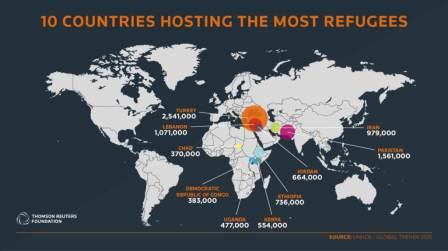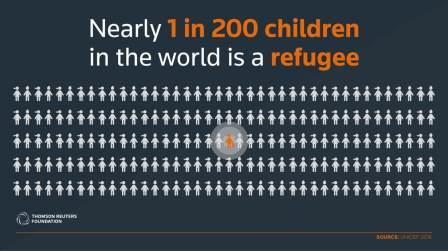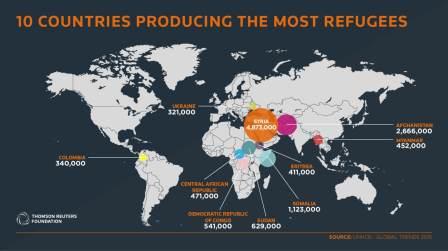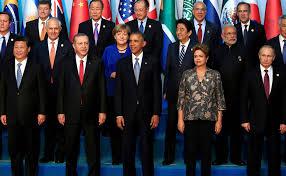As world leaders head to New York for a major U.N. summit on the refugee and migrant crisis, aid chiefs called on rich countries to shoulder their fair share of responsibility.
The meeting on Monday, the first of its kind, comes at a time of record displacement, with 65.3 million people uprooted by conflict and persecution. It will be followed by a second summit on Tuesday hosted by U.S. President Barack Obama.
Here humanitarian experts outline what they want to see:
FILIPPO GRANDI, U.N. HIGH COMMISSIONER FOR REFUGEES (UNHCR)
The nations of the world must reaffirm that refugee rights are immutable. They must resolve that not just a few countries should continue to shoulder the responsibility of hosting the vast majority of the world's refugees and that those who can must resettle or reunite many more refugees in their countries.
The countries belonging to the richer world must recognise their responsibility to provide timely and dependable humanitarian funding while robustly investing in communities that host large numbers of refugees. Host countries should increase opportunities for refugee adults to work and children to go to school. All should undertake to address the drivers and triggers causing record numbers to flee.

JAN EGELAND, SECRETARY GENERAL NORWEGIAN REFUGEE COUNCIL
Most importantly, we have to tackle the root causes of displacement. How come we find hundreds of billions to wage wars in Iraq, Afghanistan, Yemen and elsewhere, and so little for diplomacy and development that prevent conflict?
Secondly, we need a global framework where states share responsibility, and are held publicly accountable. Currently, more than 80 percent of those displaced are in a developing region. Thirdly, leaders must address the fact that two thirds of people forced to flee have not crossed a border. Internally displaced people must not fall off the agenda with no attention, protection or assistance.
MALALA YOUSAFZAI, NOBEL LAUREATE, CO-FOUNDER MALALA FUND
Prime ministers and presidents have chosen 'survival' as their theme for refugee discussions this year. Why have they set the bar so low? We can no longer be satisfied with a world where fishing children from the ocean and bandaging their wounds represents the summit of our ambition for refugees.
How long can a refugee girl be out of school before she is forced into an early marriage or child labour? How long should children wait for education? Eighty percent of adolescent refugees are out of school. Yet young refugees are future leaders on whom we will all depend for peace.
ANTHONY LAKE, EXECUTIVE DIRECTOR UNICEF
We must pay attention to the children. Every day, the crisis gets worse for them. Worldwide, 50 million children have migrated across borders or been displaced within their own countries - 28 million uprooted by horrific conflicts. Between 2010 and 2015, the number of child refugees jumped by around 75 percent. Many of the youngest have known only violence and deprivation in their short lives.
Without protection, nutrition or education, what can the future hold for these children - and thus for the future of their societies? But if they are accepted and protected today they can be a source of stability and economic progress. Good for them - and good for everyone.

LAURIE LEE, CEO CARE INTERNATIONAL
Governments must do more for women and girls. Many refugees are resorting to using dangerous routes, paying people smugglers, and using unsafe boats. Women are particularly vulnerable, as they are often responsible for children, and they are at risk of sexual exploitation.
World leaders need to commit to providing additional safe and legal routes to claim asylum. Many refugees lose contact with family members on their journey, which is why family reunification programmes are critical. Refugee women's organisations need to be involved in the Global Compact for Refugees and other commitments made at the global summits.
DAVID MILIBAND, CEO INTERNATIONAL RESCUE COMMITTEE (IRC)
Wealthy nations must share responsibility with low- and middle-income countries, who host 86 percent of the world's refugees. First, they must increase refugee resettlement for the most vulnerable. Resettlement is not a substitute for upholding rights to asylum, but it offers a legal route to hope - and escape from people smugglers.
Second, we need a new global deal for refugee hosting nations, to ensure that refugees can access employment, education, and health services. Refugees are now displaced for generations not just months; they need much more than emergency relief. Third, we need a step change in the effectiveness of the global aid system - with evidence-based interventions. Finally, there is no substitute for more effective peace-making. As long as civil wars burn, those of us on the ground are always struggling to keep up.

JOANNE LIU, PRESIDENT MEDECINS SANS FRONTIERES (MSF)
Many of the U.N. member states expected to sign the New York declaration for refugees and migrants are already contravening it with increasingly harmful migration policies which seem designed to further harm already vulnerable men, women, and children.
If 'safe, orderly and regular migration' is going to become a reality, safe and legal routes are needed, not sealed borders and inhumane and cruel reception conditions. The very real suffering that people are experiencing won't be helped by empty promises. Those driven out of their homes often become victims of violence while fleeing and they need protection and assistance.
NASER HAGHAMED, CEO ISLAMIC RELIEF WORLDWIDE
An estimated one in every 113 people on earth has been forced to flee their home. World leaders must do more to bring about a coordinated, humane and sustainable solution to this crisis. Governments must ensure the safety and dignity of refugees worldwide so that they are able to rebuild their lives.
It is crucial that we support host governments and communities also create an environment where refugees are welcomed, without the fear of facing abuse or discrimination. We must work together to ensure a generation of refugees and migrants have access to education, employment and have dignified lives.
ANN MARY OLSEN, DIRECTOR DANISH REFUGEE COUNCIL
The greatest challenge world leaders are faced with today is one of solidarity and willpower. The summits are a positive reflection of commitment at the highest political level to uphold the rights of refugees and migrants. But we must all ensure that leaders keep the promises they make at these summits so that refugees and migrants lives are improved.
Source: Trust.org
 FR
FR EN
EN AR
AR











